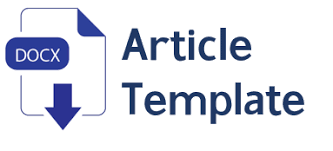Analisis Akuntansi Zakat Dalam Meningkatkan Akuntabilitas Pada Badan Amil Zakat Nasional (BAZNAS) Kabupaten Deli Serdang
DOI:
https://doi.org/10.59086/jam.v1i1.22Keywords:
Zakat, Zakat Management, Accountability, Zakat AccountingAbstract
Downloads
References
Ainun, N. (2018) ‘Faktor-Faktor Yang Mempengaruhi Akuntabilitas Laporan Keuangan BAZNAS Di Kabupaten Langkat’, in Skripsi Universitas Muhammadiyah Sumatera Utara, pp. 1–63.
Alkahfi, B. D., Taufiq, T. and Meutia, I. (2020) ‘Pengaruh Akuntansi Zakat Terhadap Akuntabilitas Publik’, Amwaluna: Jurnal Ekonomi dan Keuangan Syariah, 4(1), pp. 112–126.
Andriana, D. H. and Sayidah, N. (2018) ‘Penerapan akuntansi zakat/ infaq dan sedekah pada Badan Amil Zakat Nasional’, Jurnal analisa akuntansi dan perpajakan, 2(2), pp. 72–85.
Khairina, N. (2019) 'Analisis Pengelolaan Zakat, Infak, Dan Sedekah (ZIS) Untuk Meningkatkan Ekonomi Duafa (Studi Kasus di Lembaga Amil Zakat Nurul Hayat Cabang Medan)', Jurnal At-Tawassuth, IV(1), pp. 160-184.
Fitri, N., Bulutoding, L. and Rahman (2021) ‘Kajian Akuntansi Zakat Menuju Good Zakat Governance’, Islamic Accounting and Finance Review, 2(1), pp. 44–53.
Ritonga, P. (2017) ‘Analisis Akuntansi Zakat Berdasarkan PSAK 109 Pada Badan Amil Zakat Nasional (BAZNAS) Sumatera Utara’, Kitabah, 1(1), pp. 1–19.
Rusdiana and Nasihudin. (2018) Akuntabilitas Kinerja Penelitian, Bandung: Pusat Penelitian dan Penerbitan UIN SGD.
Rifai, F. Y. A, and Nuwun, P. (2020) 'Upaya Penguatan Transparansi dan Akuntabilitas Badan Amil Zakat Infaq dan Sadaqoh (BAZIS) Berbasis PSAK 109 dalam Kajian Literatur', Journal of Economic, Management, Accounting and Technology (JEMATech), 3(2), pp. 108-119.
Susilowati, L. and Khofifa, F. (2020) ‘Kesesuaian Akuntansi Zakat, Infak dan Sedekah Dengan PSAK 109 BAZNAS Kabupaten Tulungagung’, JAS (Jurnal Akuntansi Syariah), 4(2), pp. 162–180.
Tambunan, J. (2021) ‘Memaksimalkan Potensi Zakat Melalui Peningkatan Akuntabilitas Lembaga Pengelola Zakat’, Jurnal Islamic Cicle, 2(1), pp. 118–131.
Siregar, S. (2013). ‘Akuntansi Zakat dan Infak/Sedekah Sesuai PSAK 109’, Medan: Wal Ashari Publishing.
Downloads
Published
How to Cite
Issue
Section
License
Copyright (c) 2022 Nova Andani, Laylan Syafina

This work is licensed under a Creative Commons Attribution 4.0 International License.
This is an open-access journal. All works are published under the Creative Commons license CC-BY which means that all content is freely available at no charge to the user or his/her Institution. Users are allowed to read, download, copy, write, improve, and create derivative creation even for other lawful purposes, this license permits anyone to, as long as they cite and license the derivative creation under similar terms

This work is licensed under a Creative Commons Attribution 4.0 International License.
Most read articles by the same author(s)
- Amelia Putri Daulay, Laylan Syafina, Analisis Laporan Arus Kas Dalam Menilai Kinerja Keuangan PT. Sumber Satwa Sejahtera , Balance : Jurnal Akuntansi dan Manajemen: Vol. 1 No. 1 (2022): April 2022
- Rodizah Siregar, Laylan Syafina, Analisis Rasio Profitabilitas Pada PT. Wijaya Karya Beton Tbk , Balance : Jurnal Akuntansi dan Manajemen: Vol. 1 No. 2 (2022): Agustus 2022
- Lokot al-Amin Ritonga Lokot, Yenni Samri Juliati, Laylan Syafina , Pengaruh Tekanan Pesaing dan Beban Pokok Penjualan terhadap Penentuan Harga Jual dan Kinerja Bisnis Usaha , Balance : Jurnal Akuntansi dan Manajemen: Vol. 2 No. 3 (2023): Desember 2023


















